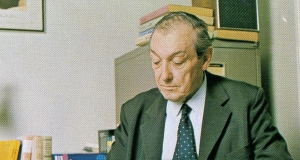Alfred Charles GIMSON
born 7 June 1917, London
died 22 April 1985, London
A.C.Gimson was a phonetician known throughout the world for his works on English pronunciation. He became Professor of Phonetics at University College London in 1966, and from 1971 until his retirement in 1983 was Head of its Department of Phonetics and Linguistics.
It was as an undergraduate at UCL, where he was to take a First in French, that Gimson first came into contact with the subject he was to make his own, through Professor Daniel Jones, then Head of the Department of Phonetics. But this was in 1939, and before he could fully develop his interest he was called up into the British army. There he acted as liaison officer, first with the French and then with the Free Polish forces. By 1945 he held the rank of Major; Jones intervened to get him an early discharge so that he could join him as Lecturer in Phonetics.
Jones groomed Gimson as his successor. When Jones retired in 1949, Gimson took over from him as Secretary of the International Phonetic Association and Editor of its journal, the Ma?tre Phonétique.
In the fifties, English phonetics was still dominated by Jones's approach. Valuable in its day, by now it was becoming dated. Gimson maintained Jones's emphasis on practical performance (both in producing and in recognizing sounds), but reinvigorated English phonetic theory and practice by propagating views deriving from contemporary American structuralist doctrine, including the /phoneme/ [allophone] notational distinction, and by extending Jonesian ear-training exercises with minimal-pair drills. When his Introduction to the Pronunciation of English first appeared in 1962, it was immediately accepted as the standard description of RP, displacing Jones's own works from this role.
Gimson was a popular lecturer and broadcaster, and in the sixties became familiar to the British public through a series of brief talks on pronunciation he gave as part of the breakfast-time Today programme on the BBC. But it is in the world of English as a Foreign Language (EFL) that his name is particularly well known. He made frequent overseas lecture tours at the invitation of the British Council, Linguaphone, or local universities. His English Pronunciation Practice (1965, with G.F.Arnold) and A Practical Course of English Pronunciation: a perceptual approach (1975) reflect his concern with the teaching of pronunciation in this context.
Perhaps Gimson's most enduring influence on EFL will be in the matter of phonetic transcription. Although Jones had experimented with a number of different types of transcription for English (all within an IPA framework), his English Pronouncing Dictionary and other EFL-oriented works used a notation in which vowel length was symbolized explicitly, but length-related quality differences only implicitly (bead bi:d, bid bid, caught k?:t, cot k?t). By the sixties this notation had a serious competitor in a system used Abercrombie and others, in which quality differences were explicitly shown and length marks not used (bead bid, bid b?d, caught k?t, cot k?t). Gimson succeeded in achieving a synthesis of the two types, such that both quantity and quality were made explicit, even at the price of added redundancy (bead bi:d, bid b?d, caught k?t, cot k?t). He popularized this notation first in his Introduction and then, crucially, in the fourteenth edition of Jones's EPD (1977; Gimson had taken over the editorship in 1964). It has swept the EFL world.
In the early 1960's University College London had set up a Department of Linguistics, separate from its long-established Department of Phonetics. When D. B. Fry relinquished the headship of the latter, in 1973, the two departments were combined under Gimson's leadership. At that time the Department's main teaching load was for students who were not registered for any University degree but for the Licentiateship of the College of Speech Therapy. Gimson took a major role in the reorganization of speech therapy education in Britain and the conversion of speech therapy (now called speech and language therapy) into an all-graduate profession. At UCL he was responsible for the arrangement whereby students of what became the National Hospital's College of Speech Sciences were registered for the BSc as undergraduates of University College. Under Jones, phonetics had been something of an orphan subject in university terms, taught only to occasional students and postgraduates; Gimson left the Department of Phonetics and Linguistics one of the strongest in the UCL Arts Faculty, with a large undergraduate body.
For some reason, Gimson did not like people to call him by his first name: indeed, its identity was something of a mystery, since as a writer, broadcaster or lecturer he was always just "A. C. Gimson". His friends and colleagues knew him as "Gim" /g ?m/. He died unexpectedly of heart attack shortly after his retirement, by which time he was President of the International Phonetic Association and not only the most influential British phonetician but one who was much loved by all his colleagues and students. ?m/. He died unexpectedly of heart attack shortly after his retirement, by which time he was President of the International Phonetic Association and not only the most influential British phonetician but one who was much loved by all his colleagues and students.
J.C.Wells 1992 12 22 |

